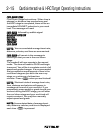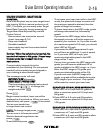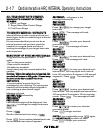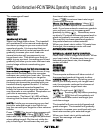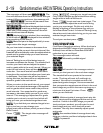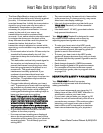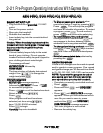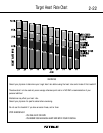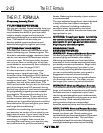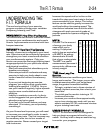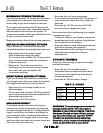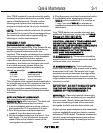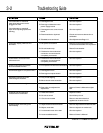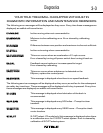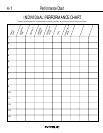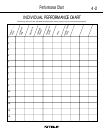
The F.I.T. Formula
2-23
THE F.I.T. FORMULA
((FFrreeqquueennccyy,, IInntteennssiittyy,,TTiimmee))
YYOOUURR FFIITTNNEESSSS PPRROOGGRRAAMM
You can get valuable fitness benefits from your
TRUE Treadmill. Using the treadmill regularly
may increase the ability of your heart and
lungs to supply oxygen and nutrients to
exercising muscles over an extended period of
time. The treadmill will also help you
develop added muscle endurance and
balanced strength throughout your body.
DDEETTEERRMMIINNIINNGG YYOOUURR NNEEEEDDSS
Calculate your maximum heart rate as a first
step in developing your fitness program. The
formula to calculate average maximum heart
rate for one minute is 220 beats per minute
minus your age. To find your pulse, locate a
vein on your neck or inside your wrist, then
count beats for ten seconds, then multiply by
six. (Refer to chart on page 2-22.)
It’s also important to know your target
training zone or target heart rate. The
American Heart Association (AHA) defines
target heart rate as 60-75 percent of your
maximum heart rate. This is high enough to
condition, but well within safe limits. The
AHA recommends that you aim for the lower
part of the target zone (60 percent) during
the first few months of your exercise program.
As you gradually progress you can increase
your target to 75 percent.
According to the
AHA, “Exercise
above 75 percent of the
maximum heart rate may be too strenuous
unless you are in excellent physical condition.
Exercise below 60 percent gives your heart
and lungs little conditioning.”
In addition to monitoring your heart rate as
you exercise, be certain of how quickly your
heart rate recovers. If your heart rate is over
120 beats per minute five minutes after
exercising, or is higher than normal the
morning after exercising, your exertion may
be too strenuous for your current level of
fitness. Reducing the intensity of your workout
is recommended.
The age-adjusted target heart rates indicated
in the previous chart reflect averages. A
variety of factors (including medication,
emotional state, temperature, and other
conditions) can affect the exercise heart rate
appropriate for you.
WWAARRNNIINNGG:: CCoonnssuulltt yyoouurr ddooccttoorr ttoo eessttaabblliisshh
tthhee eexxeerrcciissee iinntteennssiittyy ((ttaarrggeett hheeaarrtt rraattee zzoonnee))
aapppprroopprriiaattee ffoorr yyoouurr aaggee aanndd ccoonnddiittiioonn bbeeffoorree
bbeeggiinnnniinngg aannyy eexxeerrcciissee pprrooggrraamm..
BBEEGGIINNNNIINNGG YYOOUURR
EEXXEERRCCIISSEE PPRROOGGRRAAMM
WWAARRMM--UUPP
:
SSllooww aanndd DDeelliibbeerraattee EExxeerrcciissee
You are not warmed up until you begin to
perspire lightly and breath more deeply.
Warming up prepares your heart and other
muscles for more intense exercise and helps
you avoid premature exhaustion. Begin each
workout by walking even if you plan to run.
Start slowly, exploring different speeds until
you can comfortably sustain your speed, a
suggested minimum of three minutes.
Perspiration on your brow is a good indicator
of a thorough warm-up. The older you are,
the longer your warm-up period should be.
WWOORRKKOOUUTT::
BBrriisskk aanndd RRhhyytthhmmiicc EExxeerrcciissee
The workout trains and conditions your heart,
lungs, and muscles to operate more efficiently.
Increase exercise in response to your heart
rate to train and strengthen your cardiovascular
system. Concentrate on moving your arms and
legs smoothly. Walk naturally and avoid
jerking motions that can cause pulled
muscles, sprained joints, and loss of balance.
CCOOOOLL DDOOWWNN
:
SSllooww aanndd RReellaaxxeedd EExxeerrcciissee
Cooling down relaxes your muscles and gradually
lowers your heart rate. Slowly reduce your
workload until your heart rate is below 60 percent
of your maximum heart rate. The cool down
should last at least five minutes, followed by
some light stretching to enhance your flexibility.



